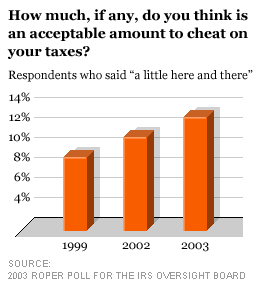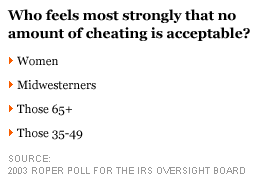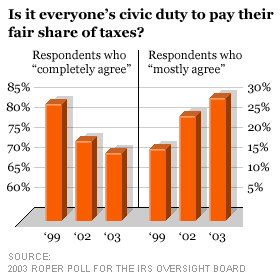NEW YORK (CNN/Money) -
Few of us actually want to pay taxes, yet most of us do. But have you ever cheated, just a little, to save yourself some money?
For instance, have you ever deducted dinners with friends along with your un-reimbursed business expenses? Or, how about neglecting to mention that you've got a tenant paying cash rent to live in your spare bedroom or apartment?
| Money Helps: Last minute tax crunch
|

|
|
|
|
If you said "No," you're in good company. The majority of us are honest Abes. But our numbers seem to be shrinking.
Eighty-one percent of Americans said that no amount of cheating on their income taxes is acceptable, according to a July 2003 Roper Poll conducted for the IRS Oversight Board.
That's a sizeable number, but it's still below the 86 percent of honest souls who said they wouldn't cheat in 2002 and the 87 percent who said they wouldn't cheat in 1999. (There's no reliable data for 2000 and 2001.)
And in a highly unscientific survey conducted online by CNN/Money this week, only 76 percent of us said we had never cheated on our taxes.
The cost of cuttin' corners
Even though self-admitted tax cheats are still in the minority, they can rack up quite a bill.

In her 2003 annual report to Congress, National Taxpayer Advocate Nina E. Olson gave a rough estimate of the damage. According to her office, the annual gap between what taxpayers owed and what they actually paid totaled $311 billion in 2001. Of that, an estimated $250 billion was due to underreporting of income.
Hello, tax shelter. The IRS estimates that hundreds of thousands of people use offshore credit, debit and charge accounts to hide taxable income to avoid paying U.S. taxes. And that's just one form of tax evasion.
Why some of us cheat

In the Roper poll, 12 percent of respondents said cheating on your taxes "a little here and there" is acceptable.
"People have this feeling that the guy next door is doing something wrong, so if they do everything right, they're dopes," said Frank Degen, a certified financial planner and enrolled agent who represents taxpayers in audits, hearings and other matters before the IRS.
That sense helps perpetuate what author David Callahan calls "the cheating culture" in his book by the same name. That culture is by no means limited to taxes, but it is fostered by the sense that the rich get away with more. And that results in a "cynicism of ordinary people who think the system is stacked against them," he said.

"When cheating becomes so pervasive that the perception is that 'everybody does it,' a new ethical calculus emerges," he writes. In other words, everyone starts playing by their own rules, rather than the official ones.
Still, Callahan believes, most of us will continue to resist the urge to cheat, but he thinks doing so will require heroic effort, unless structural changes occur to ensure greater economic fairness and equal justice.
He advocates being the hero "or even a chump ... to try to reverse the vicious cycle that occurs in a cheating culture. If you don't cheat and I don't cheat, then 'everybody' doesn't actually cheat. ... Positive norms can spread as rapidly as negative ones."
Who's likely to get caught
For those less concerned with fostering norms than just plain staying out of trouble, you might want to keep your eye out for audit news.
The odds of being audited are still slim -- and that lack of enforcement is another factor Callahan believes contributes to the cheating culture. But after years of scaling back on its enforcement, the IRS has started to scrutinize returns with greater frequency. The agency won't say who's a likely target for extra reviews, but it has made clear that taxpayers whose incomes exceed $100,000 can expect more audits than those who earn less than that.
And while the chances of being audited are low, being brazen about cheating can really backfire.
For starters, underreporting income usually isn't a clever move. The IRS automatically gets copies of W-2 and 1099 forms, so it most often knows what you earn even if you don't report it. (That's assuming, of course, you're not taking advantage of those offshore tax havens in countries where reporting requirements are more lax).
Ticking off your better half can also be a bad move. Disgruntled spouses (usually wives) may let the IRS know that their partners have been cheating on their taxes, said Degen.
"I don't want to sound sexist, but it happens a lot," Degen added. "The husband is working off the books and the wife calls the IRS."
And blowing off the Joneses is ill-advised. Neighbors have been known to notify the authorities if, say, someone has rented out their home to tenants.
The IRS also has found cheats during the course of other investigations. For example, it may audit a business that's been writing regular checks to someone who doesn't report that income on his or her return.
Even if everything you report is the honest truth, you might still raise a red flag with the IRS. Check for common mistakes and tips on ways to avoid an audit.
Editor's note: This article, originally published in April 2003, has been updated.

|

